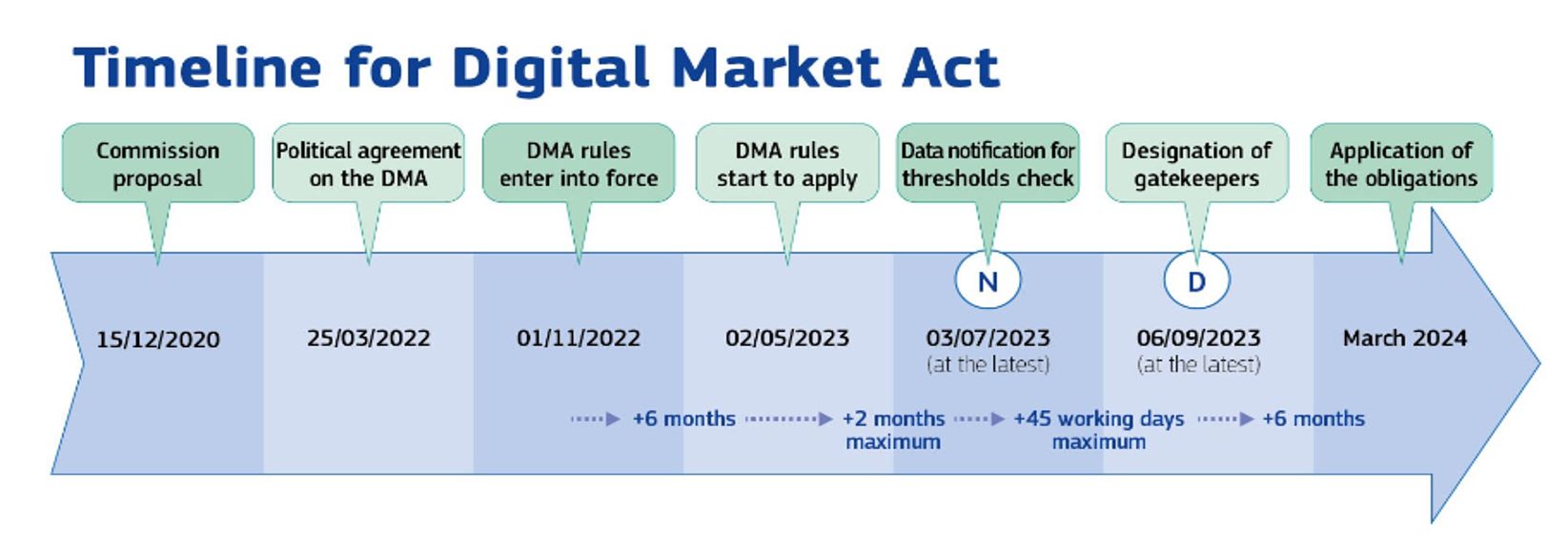The Digital Markets Act (“DMA”) is primarily concerned with controlling the conduct of sizable online platforms that serve as "gatekeepers" to the digital markets.
Platforms with great market power—known as gatekeepers—can control market access and have a significant impact on the decisions made by customers and other businesses. To promote fair and unhindered competition, the DMA provides a set of requirements and restrictions for such gatekeepers.
Platforms known as gatekeepers exercise enormous market power and serve as crucial go-betweens for businesses and customers in important digital services. DMA focuses particularly for regulating the behavior of these gatekeepers because of their systemic role in the internal market, even though there may be overlap with the types of services covered by the the Digital Services Act (“DSA”) which focuses on online platforms.
These commitments consist of:
- Prohibition of unfair practices: Gatekeepers are forbidden from engaging in self-preferencing, imposing unfair terms on users or favoring their own services or goods over their rivals.
- Data portability: Users have the right to easily transfer their data from one platform to another.
- Interoperability: Gatekeepers may be required to ensure that their services can work with other platforms and services, enabling users to easily switch between different providers.
- Transparency: Gatekeepers must provide clear information about their ranking algorithms and any actions they take to manipulate search results or visibility of services.

As of October 12, 2022, DMA was published in the Official Journal and entered into force on 1 November 2022.
Before July 3, 2023 , companies must have provided the European Commission with information about their number of users so that the Commission can designate “gatekeepers” before September 6, 2023. Gatekeepers will then have until March 2024 to ensure that they follow the obligations of the DMA.
Digital Services Act
The Digital Services Act (“DSA”) specifically focuses on online intermediaries and platforms, which play crucial roles in facilitating various online activities. Examples of such platforms include:
- Google Play
- Apple's App Store
- Booking.com
- Airbnb
- Amazon
- eBay
- YouTube
DSA focuses on improving user safety and enabling provider accountability for digital services and attempts to update the legal environment for online services. DSA adds a number of requirements for online intermediaries, including:
- Due Diligence Obligations: Online platforms are required to take precautions to identify and delete illegal information, such as hate speech, fake goods, and copyrighted material.
- Transparency and User Control: Platforms need to be more transparent about how they manage personal data, filter content, and employ algorithms. More user control over the content they view and receive is necessary.
- Independent Dispute Resolution: Platforms should set up procedures for handling user complaints and resolving disputes independently.
- Enhanced Liability Regime: Platforms may be held more accountable for failing to comply with DSA, with major violations subject to fines of up to 6% of their annual global revenue.
DMA was published in the Official Journal of the European Union as of October 12, 2022, and it became effective on November 1, 2022. Companies must tell the Commission of how many users they have by July 3, 2023 in order for the Commission to identify the "gatekeepers" before 6th of September 2023. Gatekeepers will then have until March 2024 to make sure they comply to DMA's requirements.
By February 17, 2023, online platforms must have disclosed the number of active users. The Commission will designate a platform or search engine as a very large online platform or a very large online search engine if it has more than 45 million users (or 10% of the population in Europe). These services will have four months to fulfill DSA's requirements, which include doing their first annual risk assessment and presenting it to the Commission. By the deadline of February 17, 2024, all EU Member States must name Digital Services Coordinators, and platforms with less than 45 million active users must adhere to all DSA regulations.

Contact Us
Connect with us
- Find office locations kpmg.findOfficeLocations
- kpmg.emailUs
- Social media @ KPMG kpmg.socialMedia
